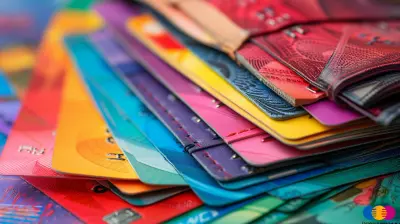Should You Use a Windfall to Pay Down Student Loan Debt?
31 May 2025
So, you just came into some unexpected cash—maybe it’s a work bonus, tax refund, inheritance, or even a lottery win (lucky you!). The question now is: should you use that windfall to pay down your student loans?
It’s a big decision, and before you go all-in on wiping out your debt, let’s take a step back and think about your options. Paying off student loans with a lump sum might seem like the obvious choice, but there are a few things to consider before throwing all that money at your loan balance.
Let's break it down together—without the boring financial jargon! 
The Case for Paying Off Student Loans
Paying off debt feels amazing, right? Imagine waking up with zero student loan payments. No more monthly deductions, no more interest chipping away at your paycheck. Tempting, isn’t it?Here’s why using your windfall on student debt might make sense:
1. Less Interest in the Long Run
Student loans come with interest rates that slowly but surely increase the amount you owe. If your loans are sitting at a high interest rate (think 6% or more), paying them off early could save you thousands over time. That’s money that stays in your pocket instead of going to the loan servicer.2. Financial Freedom Sooner
Imagine not having to worry about student loan payments every month. By knocking out that debt, you free up cash for other things—travel, homeownership, investing, or even just enjoying life without the financial stress.3. Peace of Mind
Debt can be mentally exhausting. Even if you’re making regular payments, that lingering loan balance can feel like a weight on your shoulders. Paying it off with a lump sum means one less thing to worry about. And honestly, who doesn’t want that sense of relief?
Reasons to Hold On to That Windfall
Okay, before you go throwing all your money at student loans, let's pump the brakes. While it sounds great to be debt-free, sometimes it makes more sense to keep that cash for other financial priorities.1. Do You Have an Emergency Fund?
Life happens. Cars break down, medical bills pop up, and unexpected expenses can throw you for a loop. If you don’t have at least three to six months’ worth of savings, your windfall might be better used as a financial cushion rather than wiping out debt.2. Are Your Interest Rates Low?
If you have federal student loans with an interest rate below 4% (or if you’re using an income-driven repayment plan), those loans might not be as urgent. Instead of dumping a windfall into them, investing the money could give you a better return over time.3. Do You Have Other High-Interest Debt?
Student loans often have lower interest rates compared to credit cards, personal loans, or payday loans. If you're dealing with credit card debt at 20% interest, that should be your top priority before dealing with student loans.4. What About Retirement Savings?
Think long-term. If you’re not consistently contributing to a 401(k) or IRA, it might be smarter to put that windfall into your retirement fund and let compound interest work its magic. Future you will thank present you.
Finding a Balance: A Smart Approach
So, what’s the best move? Instead of going all-in on student loans or completely ignoring them, you can take a more balanced approach. Here’s a game plan:1. Build (or Boost) Your Emergency Fund
Before doing anything else, make sure you have at least three months’ worth of expenses saved. If you don’t, set aside part of your windfall for emergencies.2. Pay Off High-Interest Debt First
If you have credit card debt, personal loans, or anything with crazy-high interest rates, tackle those before worrying about student loans. The faster you eliminate high-interest debt, the more money you’ll save in the long run.3. Consider a Partial Payment on Student Loans
Who says you have to throw all your windfall at student loans? Making an extra payment can cut down your balance and reduce interest without draining your entire financial cushion.4. Invest for the Future
If you’re in good shape financially, consider investing in a retirement account, a brokerage account, or even a high-interest savings account. Your money could grow over time instead of just reducing your debt.
When It Makes Sense to Go All-In on Your Loans
Every situation is different. If you:✔ Already have an emergency fund
✔ Have no other high-interest debt
✔ Feel secure in your job and future income
✔ Want to be debt-free ASAP
…then yes, using your windfall to wipe out student loan debt can be a smart move! If becoming debt-free instantly would bring you real peace of mind, then go for it.
Bottom Line: Make the Choice That’s Right for You
A windfall is a rare and exciting financial opportunity, but deciding what to do with it depends on your financial goals, debt situation, and overall well-being. Instead of rushing to dump it into student loans, take a step back and evaluate your options.Debt freedom is great, but so is financial security and smart investing. The best move? Find a balance that works for you.
No matter what you decide—pay off loans, invest, or save—just make sure your decision aligns with your long-term financial goals. Because in the end, the smartest move is the one that sets you up for financial success.
all images in this post were generated using AI tools
Category:
Student LoansAuthor:

Knight Barrett
Discussion
rate this article
3 comments
Jaxon McCabe
This article raises essential questions about managing unexpected financial gains. While paying down student loans can reduce interest and stress, it's crucial to evaluate personal circumstances and future goals. Balancing debt repayment with saving or investing could lead to a more secure financial future. Thought-provoking insights!
June 16, 2025 at 11:07 AM

Knight Barrett
Thank you for your thoughtful comment! Balancing debt repayment with saving or investing is indeed key to a secure financial future. Your insights highlight the importance of personal circumstances in making these decisions.
Xylo Gilbert
Consider the interest rates and potential investment returns; prioritizing high-interest loans can significantly enhance long-term financial health.
June 2, 2025 at 4:10 AM

Knight Barrett
Balancing high-interest loans with potential investment returns can indeed enhance financial health; consider both options before deciding how to use your windfall.
Paris McLemore
Why pay off student loans when you could invest in a pet rock collection? Just kidding! Seriously, it might be wise to sprinkle a bit of both!
June 1, 2025 at 5:05 AM

Knight Barrett
While investing in unique hobbies like a pet rock collection can be fun, prioritizing student loan repayment is generally a smarter financial move. Balancing both can be beneficial, but debt reduction should come first to minimize interest costs and improve financial stability.



